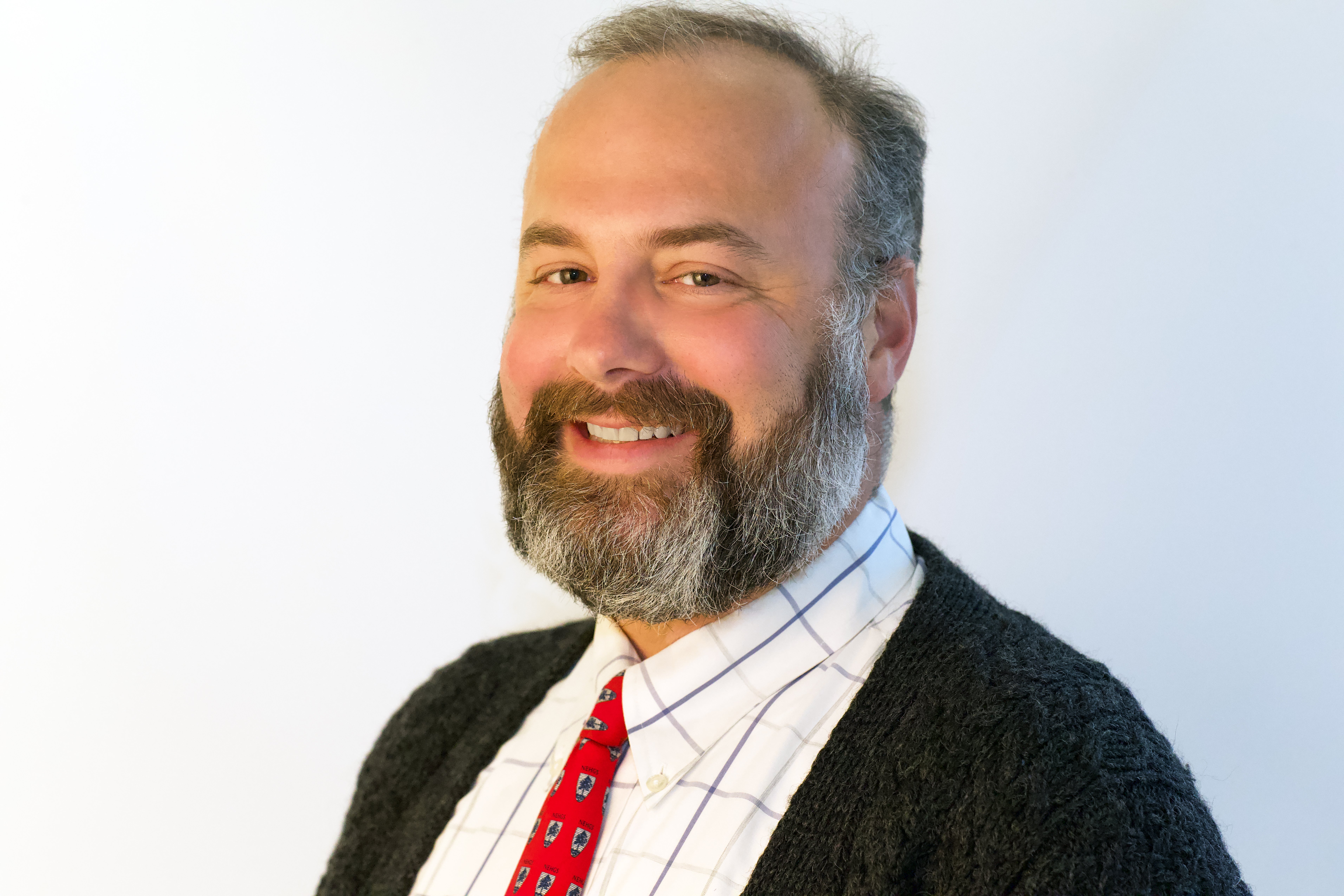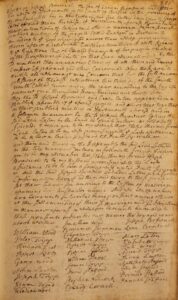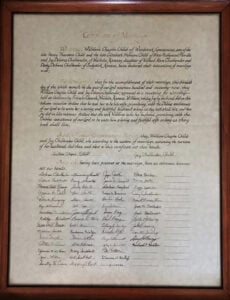The upcoming summer issue of the Mayflower Descendant includes an interesting article by Mark Wentling entitled “Joseph Brownell (1699-ca. 1773) of Dartmouth, Massachusetts, and Little Compton, Rhode Island: Corrections to the Identities of His Wives and Children.” The article examines conflicting claims in past genealogical literature and goes through numerous contemporary sources to show that one Joseph Brownell, a fifth-generation descendant of Mayflower passenger Francis Cooke, was married five times and had eight children by his first three wives.
Of particular usefulness for Mark’s article were Quaker records from Dartmouth, which are now digitally available through the Dartmouth Historical and Arts Society, including the record shown here of Joseph Brownell’s second marriage in 1736 to Leah Lawton. This marriage is also included in our three-volume database Dartmouth Vital Records to the year 1850, but the abstract therein lacks much of the above information. While Quaker records are a great genealogical resource, when I began my research in the early 1990s, they were largely not available at NEHGS. Instead, I’d rely on William Wade Hinshaw’s Encyclopedia of American Quaker Genealogy.
I do not have many Quaker ancestors in the colonial period—my mother, who was raised Methodist, has some seventeenth century Quaker ancestors in Burlington County, New Jersey, who later went south to Virginia, west to Indiana, and finally to my mother’s native Kansas. However, whenever I encounter Quaker marriage records, I’m always reminded of my parents, who had a Quaker wedding in Wichita, Kansas in 1979. Their marriage record hung framed above our family’s fireplace in my youth and looks very similar to earlier Quaker marriage records—like the marriage of Joseph Brownell and Leah Lawton, recorded over 200 years earlier.
My father was born in Philadelphia, where most of his mother’s ancestors had lived for several generations. They were mostly of German ancestry, as well as Irish and small amounts of other nationalities. While Philadelphia is well known for the Quaker settlement of William Penn in the late seventeenth century, my father’s own Quaker connections are much more recent. His maternal grandparents, Gilbert Wayne Helman (1882-1945) and Mazy Nelson Kelly (1883-1943) were both born in Philadelphia. Gilbert was baptized in the Union Methodist Episcopal Church, though his father was originally Lutheran. Mazy was raised Baptist—her mother was also originally Lutheran, and her father was an Episcopalian. Gilbert and Mazy initially raised their children Baptist, living from city to city for many years before settling in Lansdale, Pennsylvania. In 1925, Gilbert, Mazy, and their six children—including my then ten-year-old grandmother—applied to join the nearby Gwynedd Friends Monthly Meeting.
My father and his sister were raised Quaker when they lived in New Jersey and Pennsylvania. They attended meeting in Burlington County, New Jersey, where my mother’s ancestors attended in the 17th century! However, when my father was five, he moved with his parents and sister to Florida, and they largely stopped attending services.
After high school my father went to Friends University in Wichita, Kansas, a Quaker college where he met my mother, though they did not marry at that time. My mother married her first husband at her home Methodist church in Sedgwick, Kansas. Then, after my mother divorced her first husband, she reconnected with my father, and they chose to marry at the University Friends Meeting at the college where they had met. I much prefer this record to their civil marriage license, which is of limited genealogical value—it lists their names, ages, and residences, and nothing more. The Quaker record, however, also notes both the parents of each of the parties and where they lived, as well as noting that my father’s parents were deceased, followed by the signatures of all witnesses in attendance.
In my childhood, my father would occasionally take me to Gwynedd Friends Meeting in Pennsylvania, where a few members of his mother’s family still attended. There is a noticeable difference between services there—which essentially consist of an hour of silence—and at University Friends Meeting in Wichita, which includes music and singing influenced by other faiths of the region. Still, whether we are looking at Quaker marriages in 18th century Massachusetts or 20th century Kansas, the format of a Quaker marriage record has largely remained the same!
Notes
1 Found on p. 41 of 51 https://www.dartmouthhas.org/uploads/1/0/0/2/100287044/bmd_1699-1880_p_201-301_signed.pdf
Share this:

About Christopher C. Child
Chris Child has worked for various departments at American Ancestors since 1997 and became a full-time employee in July 2003. He has been a member of American Ancestors since the age of eleven. He has written several articles in American Ancestors, The New England Historical and Genealogical Register, and The Mayflower Descendant. He is the co-editor of The Ancestry of Catherine Middleton (American Ancestors, 2011), co-author of The Descendants of Judge John Lowell of Newburyport, Massachusetts (Newbury Street Press, 2011) and Ancestors and Descendants of George Rufus and Alice Nelson Pratt (Newbury Street Press, 2013), and author of The Nelson Family of Rowley, Massachusetts (Newbury Street Press, 2014). Chris holds a B.A. in history from Drew University in Madison, New Jersey. Areas of expertise: Southern New England, especially Connecticut; New York; ancestry of notable figures, especially presidents; genetics and genealogy; African-American and Native-American genealogy, 19th and 20th Century research, westward migrations out of New England, and applying to hereditary societies. Chris has lectured on these topics and edits the genetics and genealogy column for American Ancestors.View all posts by Christopher C. Child →

